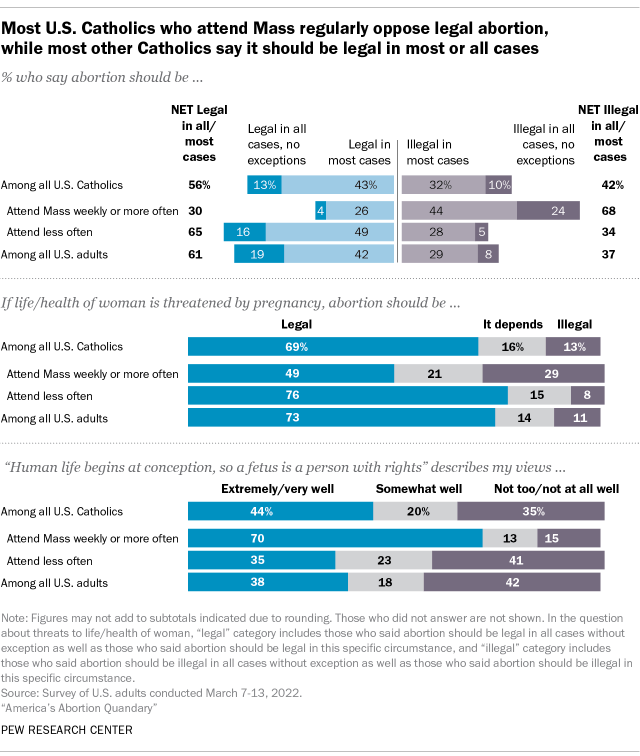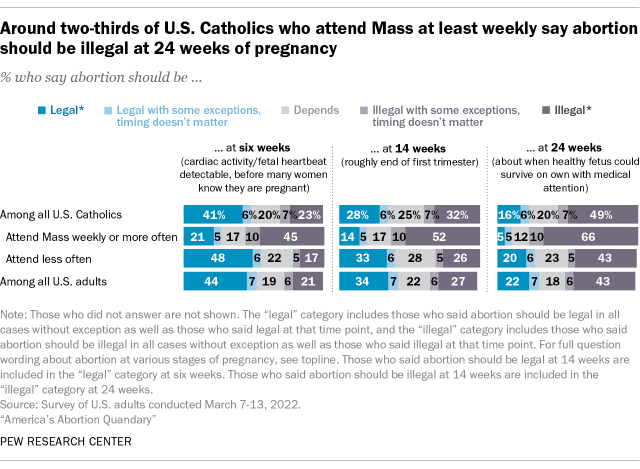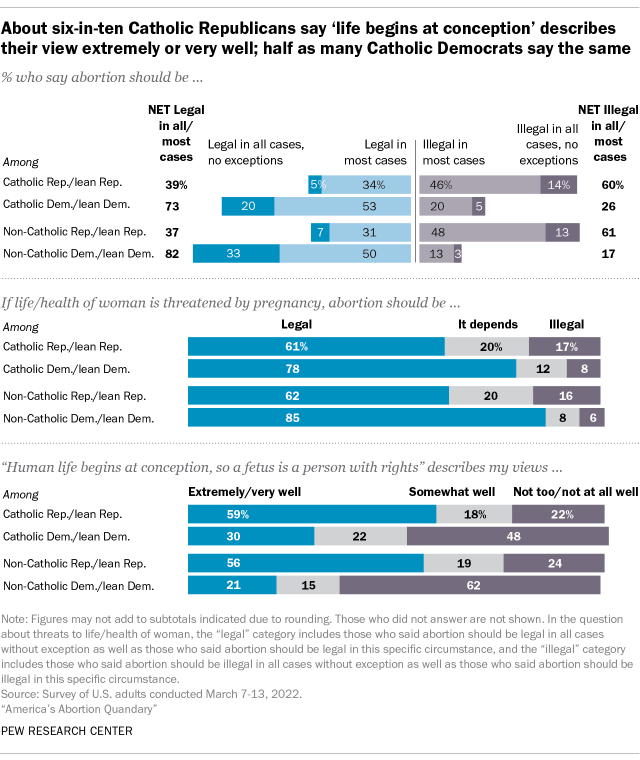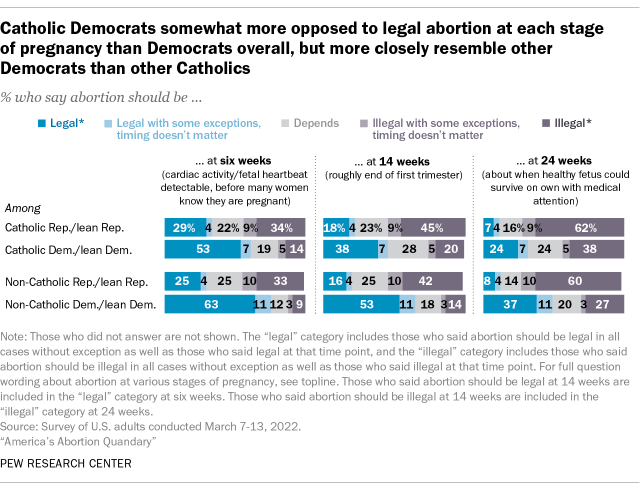The Catholic Church in the United States has long been one of the foremost opponents of legal abortion, teaching that human life is sacred “from conception to natural death” and that unborn children have a “right to life.” But for U.S. Catholics, the abortion issue isn’t so clear-cut. Like the American public as a whole, most Catholics think abortion should be illegal in some cases but legal in others, according to a recent Pew Research Center survey.
And just as U.S. adults overall are divided along religious and political lines in their attitudes about abortion, so are Catholic adults. Catholics who attend Mass regularly are among the country’s strongest opponents of legal abortion, and they are also more likely than those who attend less frequently to believe that life begins at conception and that a fetus has rights. Meanwhile, Catholic Republicans are far more conservative on a range of abortion questions than are Catholic Democrats.
Pew Research Center conducted this study to examine attitudes among Catholics about abortion in the United States. For this analysis, we surveyed 10,441 U.S. adults, including 2,224 Catholics, from March 7-13, 2022. Everyone who took part in the survey is a member of the Center’s American Trends Panel (ATP), an online survey panel that is recruited through national, random sampling of residential addresses, which gives nearly all U.S. adults a chance of selection. The survey is weighted to be representative of the U.S. adult population by gender, race, ethnicity, partisan affiliation, education and other categories. Read more about the ATP’s methodology.
Here are the questions used for this analysis, along with responses, its methodology, and detailed tables on U.S. Catholics’ views of abortion (including sample sizes/margins of error).
Overall, about three-quarters of U.S. Catholics (76%) say abortion should be illegal in some cases but legal in others. Just one-in-ten say abortion should be illegal in all cases, with no exceptions, while a similar share (13%) take the position that abortion should be legal in all cases, without exceptions.
About seven-in-ten Catholics say abortion should be legal if the pregnant woman’s life or health is threatened (69%), and two-thirds say it should be legal if the pregnancy is the result of rape (66%). At the same time, roughly two-thirds of Catholics say how long a woman has been pregnant should be a factor in determining abortion’s legality (63%), with larger shares opposing abortions in the late stages of a pregnancy than in the early stages.

Among Catholics who attend Mass at least once a week, about two-thirds (68%) say abortion should be illegal in all or most cases, and about half or fewer support exceptions that would make abortion legal in the case of rape (43%) or threats to the life or health of the mother (49%).
Most Mass attenders also believe life begins at conception. Seven-in-ten Catholics who go to church at least once a week say the statement “Human life begins at conception, so a fetus is a person with rights” describes their own views very or extremely well.
On these core questions about abortion’s legality and the start of human life, Mass-attending Catholics are about as conservative as White evangelical Protestants, who stand out among U.S. religious groups for their strong opposition to abortion.
In stark contrast, most Catholics who do not attend Mass weekly (65%) say abortion should be legal in all or most cases, including three-quarters who say it should be legal in cases of rape or threats to the well-being of the pregnant woman. Only around a third of Catholics who attend Mass less than once a week (35%) say they believe life begins at conception.
The survey also asked respondents whether abortion should be legal at particular stages of a pregnancy, including at 24 weeks, which is about when a healthy fetus could survive on its own with medical attention; 14 weeks, which is roughly the end of the first trimester; and six weeks, about when cardiac activity (sometimes called a fetal heartbeat) is detectable and before many women know they are pregnant.
Among Catholics who attend Mass at least once a week, two-thirds say abortion should be illegal at 24 weeks of pregnancy, while just 5% say it should be legal. Roughly one-in-ten regular Mass attenders (12%) say “it depends” when asked whether abortion should be illegal or legal at 24 weeks, while the remainder say the length of a pregnancy shouldn’t be a factor.
About half of Catholics who attend Mass at least weekly say abortion should be illegal at 14 weeks of pregnancy, while 14% say it should be legal at that stage and 17% say “it depends.”
Catholics who attend Mass less than once a week are far less likely to say abortion should be illegal at each stage of pregnancy asked about in the survey. For instance, 26% of these Catholics say abortion should be illegal at 14 weeks, while 33% say it should be legal at this stage and 28% say “it depends.”

Political affiliation, too, is tied to large differences in opinion on these questions. A majority of Catholic Republicans and Republican-leaning independents say abortion should be illegal in most or all cases (60%) and that the statement “life begins at conception” describes their view extremely well or very well (59%). By contrast, most Catholic Democrats and Democratic leaners say abortion should be legal in most or all cases (73%), and only three-in-ten believe that life begins at conception. However, majorities of Catholics on both sides of the political divide say abortion should be legal in the cases of rape or danger to the pregnant woman’s life or health.

On many of the questions about abortion’s legality, the views of Catholic Republicans closely resemble the views of other Republicans. For instance, 62% of Catholic Republicans say abortion should be against the law at 24 weeks into a pregnancy, while 7% say it should be legal and 16% say “it depends.” Among non-Catholic Republicans, 60% say abortion should be illegal at 24 weeks, 8% say it should be legal, and 14% say “it depends.”
Catholic Democrats, by contrast, tend to be somewhat more opposed to abortion than other Democrats. For example, the share of Catholic Democrats who say abortion should be against the law at 24 weeks of pregnancy is 11 percentage points higher than the share of non-Catholic Democrats who say this (38% vs. 27%). And the share of Catholic Democrats who say abortion should be legal at 24 weeks is 13 points lower than the share of non-Catholic Democrats who say this (24% vs. 37%). Still, in their opinions about abortion, Catholic Democrats tend to more closely resemble other Democrats than they do Catholic Republicans.

Catholic women are a bit more likely than Catholic men to say abortion should be legal in all or most cases (60% vs. 53%), and they are also more likely to say the decision about whether to have an abortion should belong solely to the pregnant woman. More than half of Catholic women (56%) say this view describes them extremely well or very well, compared with 41% of Catholic men. In general, however, the differences between Catholic men and women are relatively modest. The survey also finds only minimal differences in the abortion views of White Catholics and Hispanic Catholics.
Note: Here are the questions used for this analysis, along with responses, its methodology, and detailed tables on U.S. Catholics’ views of abortion (including sample sizes/margins of error).
